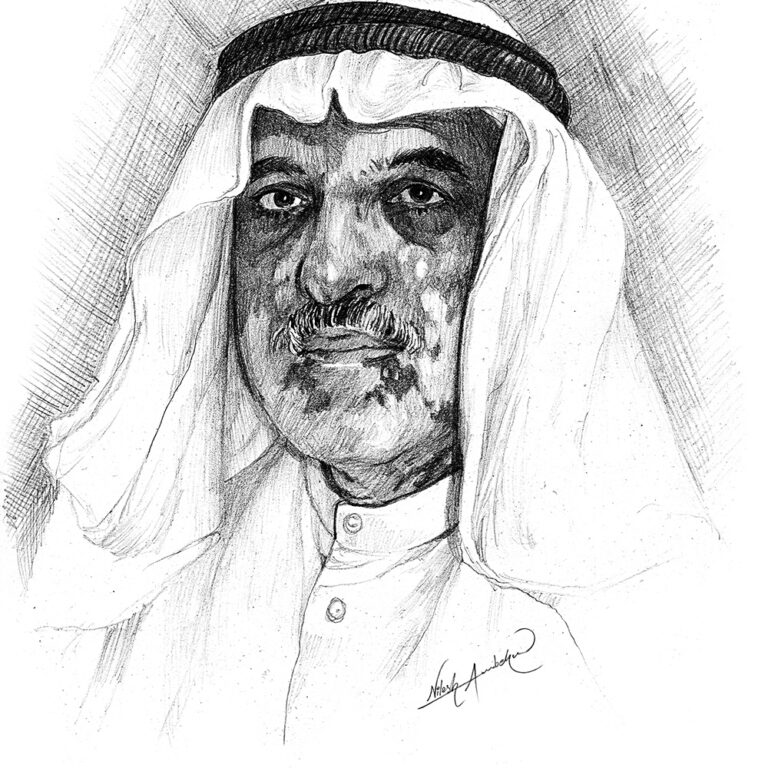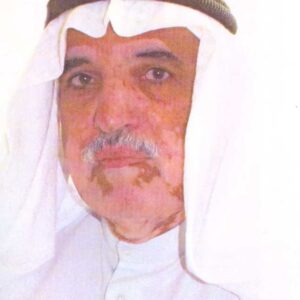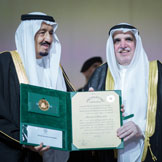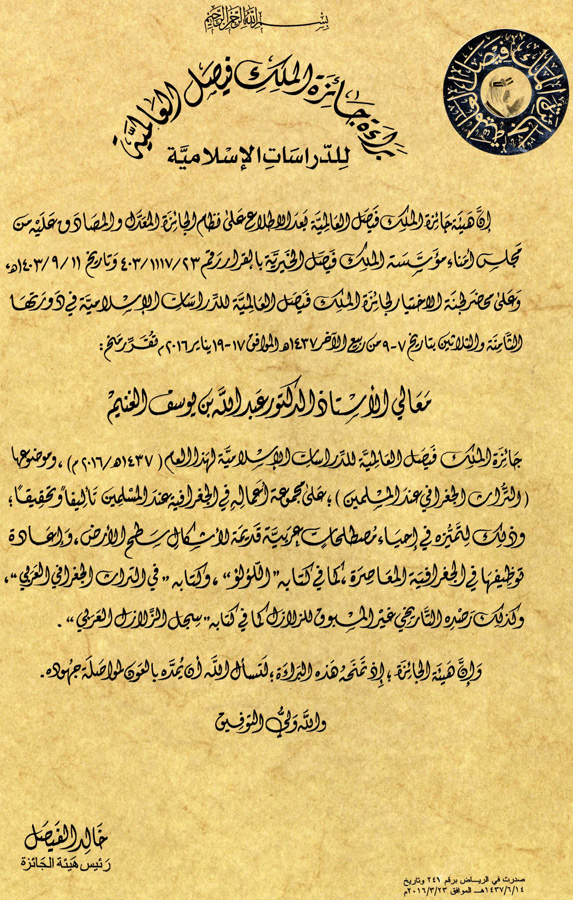

H.E. Professor Abdullah bin Yousif Al-Ghunaim
King Faisal Prize in Islamic Studies 2016 Laureate
Topic: "Muslim Geography Heritage"
Field studies are the best way to verify information contained in books

Abdullah Al-Ghunaim completed his high school education in Kuwait then joined Cairo University in the Arab Republic of Egypt, where he earned Licentiate in Arts (Geography) in 1969, a Master’s degree (First Class Honors) in 1973 and a Ph.D. (First Class Honors) in 1976. During his career, spanning nearly forty years, he assumed many academic, administrative, and executive tasks. As a faculty of Kuwait University, he progressed quickly from an Assistant Professor to full Professor of Geography at College of Arts, chaired the Geography Department, and became Dean of the College of Arts., He was also appointed a Minister of Education twice from 1996-1998 and from 1990-1991. Thereafter, he was appointed an Emeritus Professor of Geography in Kuwait University.
Professor Al-Ghunaim also served as a Director of the Arabic Manuscripts Institute of the Arab Organization for Education, Science and Culture, a Consultant to the National Council for Culture, Art and Literature, the Founder and Head of the Research and Translation Unit of the Geography Department in Kuwait University, a Member of the Board of Directors of the Manuscripts Museum in Alexandria Library, an Advisory Council of the Manuscripts Institute of the Arab League of Nations, a Board of Governors of the Islamic Organization of Medical Sciences, and many other advisory committees and cultural and scientific institutions. Besides, he founded the Research and Studies Center of the Kuwaiti Council of Ministers.
Professor Al-Ghunaim is a member of the Arabic Language Academies in Damascus and Egypt, the Russian Academy for Social Studies, the International Academic Council of the Islamic Studies Center at Oxford University, the Royal Academy of Al-Albayt Foundation for Islamic Thought, the Board of Directors of the Gulf University, Bahrain, and the Kuwaiti, Saudi, Egyptian, and American Geographical societies.
He is also Chief Editor of the Gulf and Arabian Peninsula Studies journal and a member of the Board of Directors of the Journal of Humanities, Editorial Board of Annals of the College of Arts, Kuwait University, Advisory Board of the Jordanian Journal of History and Archeology, Gulf Journal of Geography and Journal of Arabic Sciences and Humanities, Qassim University, Saudi Arabia, and a former member of the editorial boards of Al-Bayan and the Kuwaiti Arts and Education Journal. He participated in about 50 Arab and international conferences and symposia, and was a Visiting Professor at the Department of Science History at Harvard University, USA, and the Center for Islamic Studies at Oxford University, U.K., and a lecturer or an examiner of post-graduate studies in several Arab universities.
In addition to his numerous research publications, Professor Al-Ghunaim authored, critically edited, and or supervised many books dealing with Arabic and Islamic geographic legacy. He visited and carried out field studies in geographical and historic sites in Saudi Arabia. Yemen, Sultanate of Oman, Qatar, Bahrain, and Jordan. He also participated in developing sociology curricula in Gulf countries and in serving the community through his chairmanship of the Board of Directors of the Endowment Fund for Scientific and Social Development.
Professor Al-Ghunaim is acclaimed for his distinguished venture to revive ancient Arabic terms on shapes of the earth’s surface and adapt them to contemporary geography. This is the best exemplified by his Arabic texts: “The Pearls” and “Arabic Geographic Heritage,” in addition to his unprecedented record of earthquakes in his book “Arabic Register of Earthquakes.”
He was awarded the Accolade of Independence by the Jordanian Hashemite Kingdom (2013), Prize of the Kuwait Foundation for Advancement of Science for his contributions to Arab scientific heritage (1985), the Saudi Geographical Society Prize for Arab innovators (2004) and Prince Salman bin Abd Al-Aziz (now Custodian of the Two Holy Mosques) Prize for Studies on the history and geography of the Arabian Peninsula (2014). In the same year, he was named ” Heritage Personality of the Year” by the Arab Education, Science and Culture Organization.
This biography was written in the year the prize was awarded.
- حصل على جائزة التميز الخليجي عام 2016
- اختير شخصية معرض الكويت الدولي للكتاب لعام 2024
- اختير عضوًا في مؤسسة الشارقة الدولية لتاريخ العلوم عند العرب والمسلمين عام 2016م



